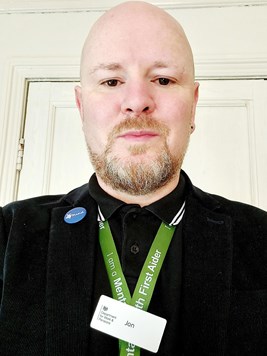Disability employment adviser
Each issue, a different professional shares their expert advice and gives information to help you support your child. This time Jon, a disability employment adviser, shares his thoughts.

What does your job involve?
I work with people claiming different benefits, with employers and with training providers. The main part of my role is to help people with disabilities or health conditions to get all the support they need to move into training or employment.
Recently, I helped a deaf lady attend an Interview Skills and Confidence Building course. I contacted the provider and discussed her needs with them, and they agreed to do one-to-one sessions with a British Sign Language (BSL) interpreter to support.
What are the most common questions you hear from deaf young people?
What support is there? How can I access this support? Will people know to face me when talking to me? Can I get a BSL interpreter to come with me to an interview? Or they might say, “I don’t want to keep telling everyone I’m deaf all the time.”
My advice would be – never be afraid to ask questions. We’re always more than happy to listen, give advice and help find answers for you.
What difficulties can some deaf young people face in getting jobs?
A lot of young deaf people I speak with aren’t aware of all the support that’s available to them when looking for work and once they’re in work. If you speak openly and honestly to your work coach and to us, we’ll do our best to help you get this job and overcome any barriers.
Deaf young people may have concerns that their employer won’t be deaf aware. What is your advice on this?
We can help by giving information on Disability Confident employers who have made a commitment to recruit and retain disabled people and those with health conditions. Also, if you raise your concerns with us, then we can contact the potential employer.
What are your top tips for deaf young people who are job hunting?
Research the Access to Work scheme, which can help with specialist equipment and support. Make sure your CV is individual to you and tailor it to the role. Research the company and practise interview skills with friends.
Finally, have self-belief – remember your worth and that you can do this!
What’s the best and most challenging part of your job?
The best part of my job is helping people gain confidence and self-belief, and witnessing the change in them once they’ve achieved their goal. I would say the most challenging part of my role is meeting people who’ve lost all belief in themselves and their abilities.
Thankfully, I’m able to help them and ultimately give them the confidence and support to transform their lives for the better.
